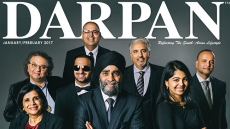Abhayjeet’s interest in the environment grew after noticing his older being heavily involved in volunteerism; he decided to join Sukhmeet in the BC Hydro Water Champion program to limit the amount of water usage in their house.
The youngest among DARPAN’s list of seven inspiring youth, Abhayjeet Sachal is dedicatedly involved in volunteerism and advocating for the environment and social causes, while excelling in his studies. The 17-year-old is a grade 12 student in the IB (International Baccalaureate) Program at Seaquam Secondary in Delta, BC, and hopes to study programs in global health or rural medicine ahead. Abhayjeet was also placed on the school’s principal list for academic excellence in the 2017 – 2018 school year.

Abhayjeet’s interest in the environment grew after noticing his older brother Sukhmeet being heavily involved in volunteerism; he decided to join his brother in the BC Hydro Water Champion program to limit the amount of water usage in their house. “This led me into becoming more passionate about the environment and I began speaking to teachers about recycling and engaging in discussions on ways to reduce waste at community events,” recalls the young environmentalist who also sat on the Delta Green committee alongside facility directors and district superintendents to shape environmental policy. In secondary school, he got immensely involved in the cause through environmental clubs, community cleanups, fundraisers, preservation initiatives, building a community rain garden, and giving presentations at local schools to inspire youth to work collectively on sustainable actions.

In 2016, Abhayjeet received a $12,000 Scholarship from the United States Embassy to travel to the Arctic. “Witnessing climate change firsthand at the UNESCO World Heritage Site in Illulisat, Greenland, his perspectives on environmentalism were forever changed,” he shares. Soon, both brothers founded the non-profit organization, Break The Divide (BTD) Foundation, to address this lack of personalization of climate change. “The main objective of Break The Divide is to promote well-being, which derives from quality education, gender equality, and reduced inequality. One of the main reasons why this program is innovative is because it directly involves youth and Indigenous peoples together, which is something that has not been done before,” points out the enthusiastic activist. BTD allows Indigenous Elders and Indigenous youth to educate other youth and educators across Canada and worldwide. As the program develops, youth will have a chance to have a pen-pal through which they will decide on initiatives they are passionate about solving. “Currently, Break The Divide Foundation has chapters at various schools in various communities across British Columbia and Canada. I am also currently building an app that will allow our various chapters to collaborate on projects with each other,” adds Abhayjeet, the recipient of a Shaw Kindness Sticks Grant of $5,000 for BTD’s work.

Last year in March, Abhayjeet was a key presenter at the 2018 Southeastern Environmental Education Alliance Conference hosted by the League of Environmental Educators in Florida. “I spoke to environmental educators from around the world about the importance of personalized learning in regards to climate change.” In June 2018, he spoke at the EcoSikh Annual Gala in Washington, DC, interacting with professionals from across the United States. Later in November, Abhayjeet was a keynote presenter at the North American Association for Environmental Education annual conference in Spokane, Washington. “The greatest experiences were traveling to Florida and Washington, DC to speak at environmental conferences and connecting with professions in those locations,” expresses the teenager while talking about his best moments of 2018.
This year, besides focussing on his further studies, Abhayjeet hope to continue to speak at international conferences about BTD and expand the program to schools around the world. “Perhaps the greatest project for Break The Divide in 2019 is to host another series of Mental Health Awareness events at our different schools across the Lower Mainland and lead an international water challenge in coalition with our chapter in Cape Town, South Africa.”

What is your advice for those who wish to follow your path?
Create your own path. I was immensely influenced by those around me, but ultimately I was able to find my own passions based on personal experiences. I have been fortunate to be mentored by incredible role models, and I think having a true dedication for the work you are doing is paramount in terms of making a difference in the community. It is necessary to do work that you love with people that you enjoy working with.
What does volunteering and community service mean to you?
To me, community service is all about creating opportunities for others to succeed. It is about ensuring that we can all live in a healthy environment where we can pursue our interests and live our best lives. I have found through my work in community activism that it is necessary to connect with people from different walks of life and engage in dialogue with everyone. Community service is about creating incentives for change to happen in an organic manner, based on the true will of people, and that process begins with understanding.

